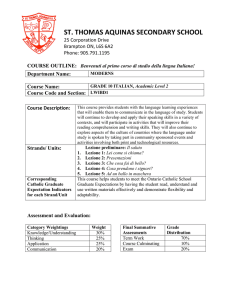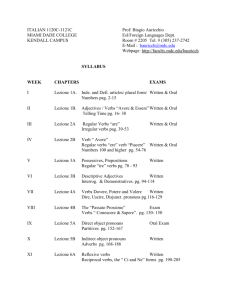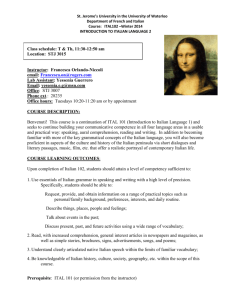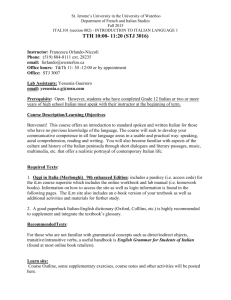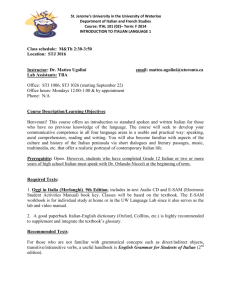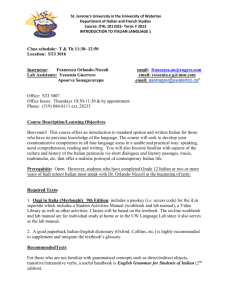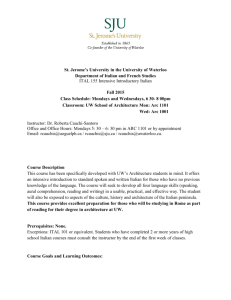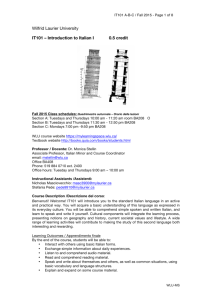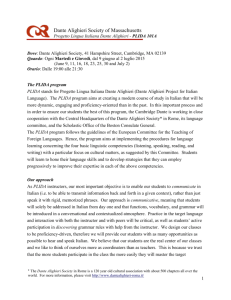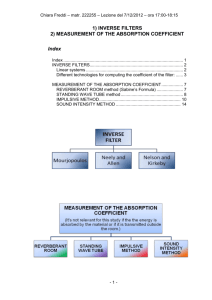Italian I & II - The Chinese University of Hong Kong
advertisement
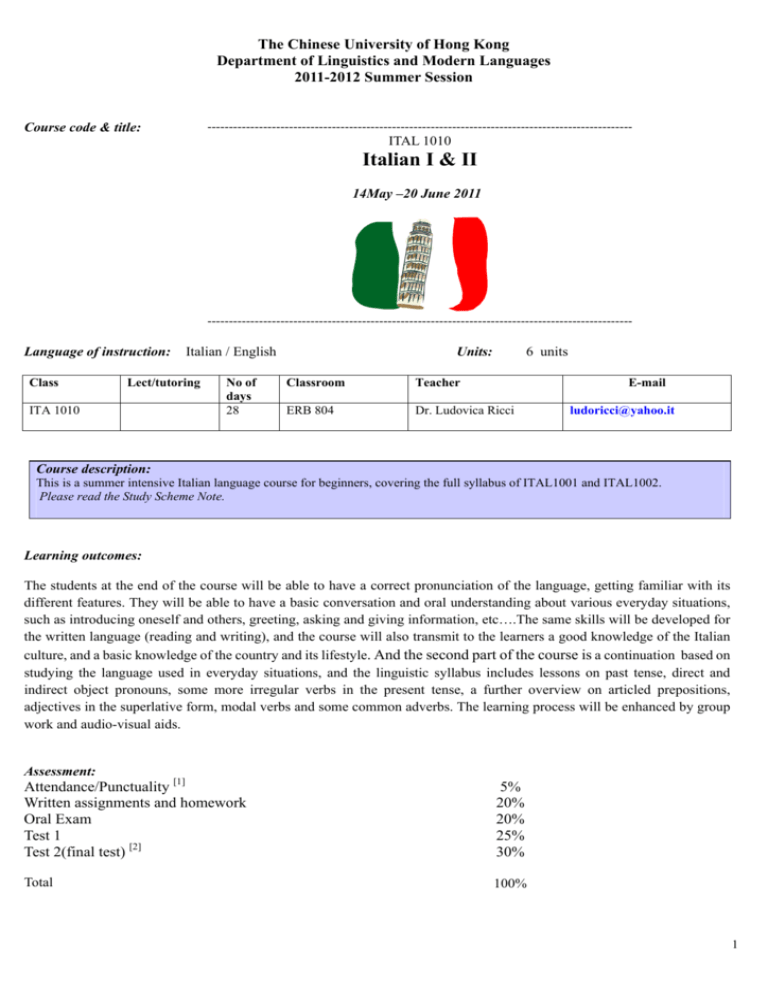
The Chinese University of Hong Kong Department of Linguistics and Modern Languages 2011-2012 Summer Session --------------------------------------------------------------------------------------------------- Course code & title: ITAL 1010 Italian I & II 14May –20 June 2011 --------------------------------------------------------------------------------------------------- Language of instruction: Class Italian / English Lect/tutoring ITA 1010 No of days 28 6 units Units: Classroom Teacher E-mail ERB 804 Dr. Ludovica Ricci ludoricci@yahoo.it Course description: This is a summer intensive Italian language course for beginners, covering the full syllabus of ITAL1001 and ITAL1002. Please read the Study Scheme Note. Learning outcomes: The students at the end of the course will be able to have a correct pronunciation of the language, getting familiar with its different features. They will be able to have a basic conversation and oral understanding about various everyday situations, such as introducing oneself and others, greeting, asking and giving information, etc….The same skills will be developed for the written language (reading and writing), and the course will also transmit to the learners a good knowledge of the Italian culture, and a basic knowledge of the country and its lifestyle. And the second part of the course is a continuation based on studying the language used in everyday situations, and the linguistic syllabus includes lessons on past tense, direct and indirect object pronouns, some more irregular verbs in the present tense, a further overview on articled prepositions, adjectives in the superlative form, modal verbs and some common adverbs. The learning process will be enhanced by group work and audio-visual aids. Assessment: Attendance/Punctuality [1] Written assignments and homework Oral Exam Test 1 Test 2(final test) [2] 5% 20% 20% 25% 30% Total 100% 1 -------------------------------------------------------------------------------------------------------------------------------------------------------------[1] You are required to attend at least 75% of the class. Treat 75% attendance as the minimum, not the maximum. The success of your own learning will highly depend on your attendance. Should you miss more than 25% of the class, you will automatically fail the course. If you are unable to attend, get informed about what content and homework you missed and make it up yourself. [2] Test 2 include: Listening comprehension, reading comprehension, grammar & written expression. Course material: Textbook: LINEA DIRETTA 1A (includes exercises section, grammar tables , available in the 2nd University Bookstore at Li Wai Chun building. Readings & references: • • Different audio-visual materials can be found through the University library system A desk-size bilingual dictionary (pocket-size dictionaries are not recommended Course syllabus: The course will cover the first 6 units of the textbook Linea Diretta 1A Unit Lezione 1 CIAO, COME STAI? Speech acts - Greetings - Introducing yourself and others - nations & nationalities - offering something - titles and professions - how to make the spelling Grammar - Personal pronouns - Formal/informal approach - alphabet - present tense of “to be” - definite and indefinite articles - nouns and adjectives in the singular form - present tense of regular and some irregular verbs -some prepositions Lezione 2 CHE COSA PRENDI? - Recall someone’s attention - ordering something - to thank someone - asking/giving information - reporting personal events and situations - asking/answering the time - Numbers (0-100) - plural of nouns, adjectives and articles - accordance of adjectives with nouns - indicative present tense of regular verbs and of some irregular verbs - “there is & there are” - Prepositions (a-in) - the time Lezione 3 HO UNA CAMERA PRENOTATA - Booking a room - expressing preferences and describing places - confirming a booking - talking about holiday places - making a phone call - the verb “piacere” - Ordinal and cardinal numbers - the verb “dare” - articled prepositions “su, da, a“ - plural of nouns in –co and –go - date (days and months) How to get to a place: asking/giving Indicative present tense of the irregular verbs information; Talking about and describing “uscire, sapere, venire”, the modal verbs “volere, public places of interest; sending one to dovere, potere”; direct pronouns (“lo, la, li, le”); someone else; family members; talking articled prepositions; adverbs construction; the about family life. indefinite pronouns “tutto, ogni” Lezione 5 Reporting about a journey; getting The past tense of transitive and intransitive verbs, information and talking about places of adjectives in the superlative form; the use of of the HO SAPUTO CHE HAI holiday; making suggestions about places impersonal subject “si”; FAFATTO UN VIAGGIO to visit. the partitive article in the plural form Lezione 4 SENTA, SCUSI! Lezione 6 CHE COSA CCONSIGLIA? Talking about food; recommending and The position of the object direct in the sentence. getting suggestions The partitive pronoun “ne” CI 2 Schedule (Subject to change): ITAL 1010 Date Public Holidays Day 1 May 14 Introduction, Lezione 1 Day 2 May 15 Lezione 1 Day 3 May 16 Lezione 1 Day 4 May 17 Lezione 1 Day 5 May 18 Lezione2 Day 6 May 21 Lezione 2 Day 7 May 22 Lezione 2 Day 8 May 23 Lezione 3 Day 9 May 24 Lezione 3 Day 10 May 25 Lezione 3 Day 11 May 28 Lezione 3 Day 12 May 29 Lezione 3 Day 13 May 30 Lezione 3 Day 14 May 31 Revision /Test 1 Day 15 June 1 Lezione 4. Review previous ones Day 16 June 4 Lezione 4 Day 17 June 5 Lezione 4 Day 18 June 6 Lezione 4 Day19 June 7 Lezione 5 Day 20 Day 21 Day 22 June 8 June 11 June 12 Lezione5 Midterm test Lezione 6 Day 23 June 13 Lezione 6 Day 24 June 14 Lezione 6 Day 25 June 15 Lezione 6 Day 26 June 18 Day 27 Day 28 June 19 June 20 Lezione 6 Revision. Final test Oral exam 3 For further information, please contact: Modern Languages (Deputy Telephone Head) Ms Annette Frömel 3943 7064 General Office 3943 7110 Email Office annette@arts.cuhk.edu.hk lin@cuhk.edu.hk G26, Leung Kau Kui Building G17 Leung Kau Kui Building Feedback for Evaluation Our language programme highly values students’ feedback and comments and is happy to use them for reflection on our teaching and improvement. Students are very welcome to provide comments and feedback on the course any time to their course teacher or the course level coordinator through email or in personal conversation. In addition, students’ feedbacks will be collected in the middle of the term through an open-end questionnaire and the teacher will discuss the feedbacks in class and make improvements if necessary. The course will also follow the university’s course evaluation exercise at the end of the term, and students’ feedbacks will be used for future course planning and teaching. Attention is drawn to University policy and regulations on honesty in academic work, and to the disciplinary guidelines and procedures applicable to breaches of such policy and regulations. Details may be found at h ttp ://www.cuhk.edu.hk/po licy/academich onesty/. With each assignment, students will be required to submit a statement that they are aware of these policies, regulations, guidelines and procedures. 4
